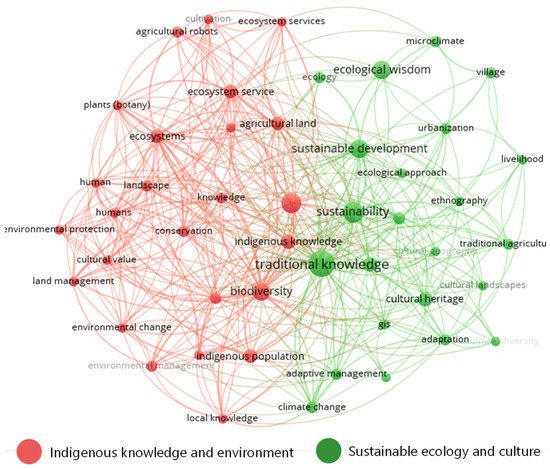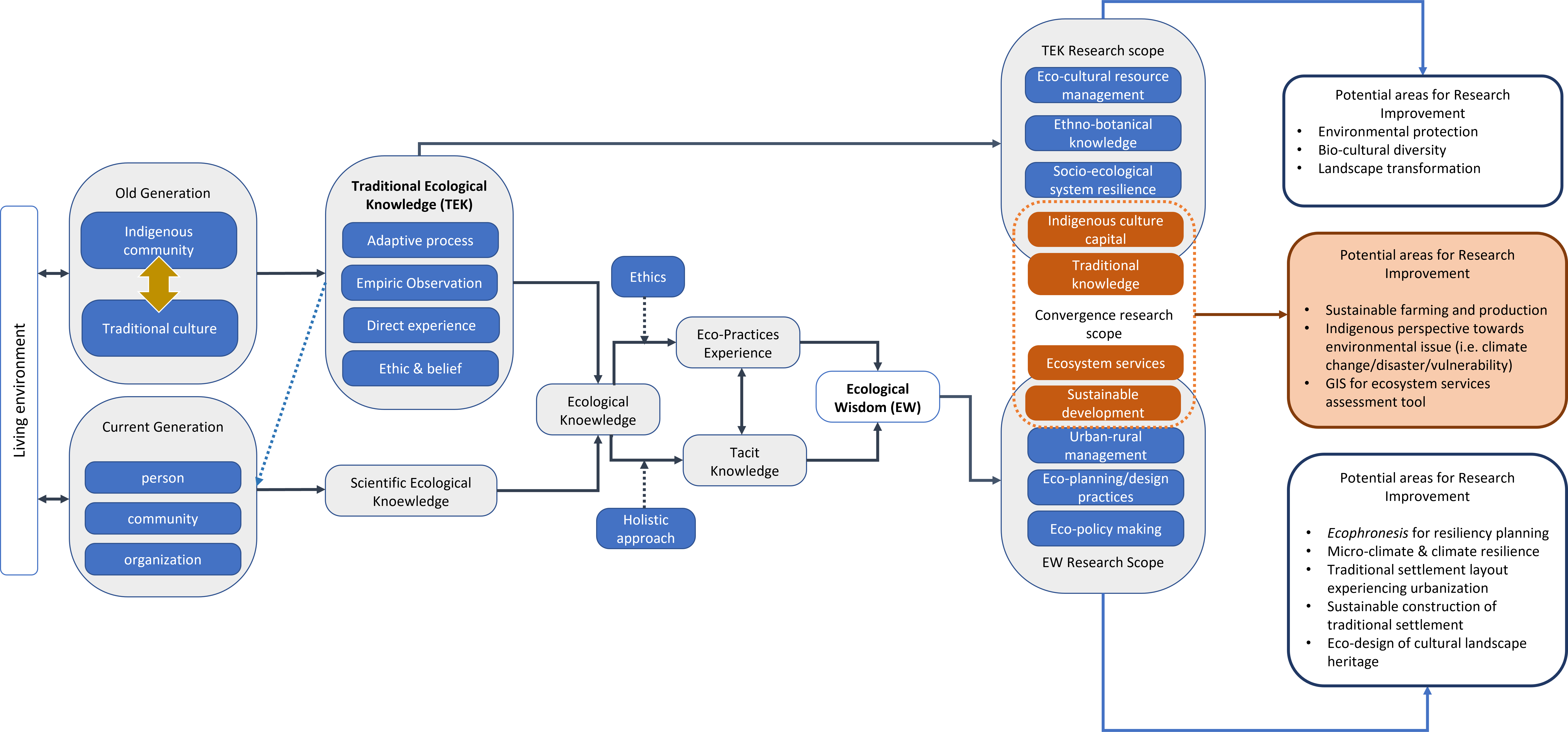
| Version | Summary | Created by | Modification | Content Size | Created at | Operation |
|---|---|---|---|---|---|---|
| 1 | Rosyi Damayanti T. Manningtyas | -- | 7109 | 2022-08-14 07:50:49 | | | |
| 2 | Rosyi Damayanti T. Manningtyas | -5693 word(s) | 1293 | 2022-08-15 16:11:58 | | |
Video Upload Options
A novel concept has emerged in the landscape planning and design field as a response to environmental sustainability, which is known as ecological wisdom (EW). EW is defined as the ability to make prudent actions in contextual ecological practices. On the other hand, Traditional ecological knowledge (TEK) has been developing for a long time and become a reference for environmental management. It refers to the evolving knowledge acquired by indigenous and local peoples over hundreds or thousands of years through direct contact with the environment. It is concerned with the relationship of living beings (including humans) with their traditional groups and environment. This study would like to search for evidence and define the distinction between both topics and find that they are distinct from their definition, agent, sources, and research scope. This study also found that TEK and EW could be similar when discussing the topic of indigenous culture capital, traditional knowledge, ecosystem services, and sustainability in the context of cultural landscape research. It also proposed a conceptual framework to help scholars to understanding the relationship between TEK and EW in the cultural landscape. Furthermore, states the potential areas for research improvement among TEK, EW, and its convergence.
1. Introduction
The idea of this study is inspired by the argumentation that traditional ecological knowledge and ecological wisdom are similar in research and confounding when determining the research scope. Research on traditional ecological knowledge has been conducted since 1994 and become a reference for managing the environment. While the topic of ecological wisdom has emerged since 2016 and become a new discourse in landscape planning and design. Liao and Chan (2016) argued that TEK and EW are relatively indistinct in research. Both have closely linked to each other in literature [1] and are referred to as the knowledge-practice-belief complex. Moreover, Xiang (2016) attempts to conflate terminology into ecophronesis terms, which emphasizes the application of knowledge in wise action [2]. However, there are other points of view that equalizing TEK and EW could be misled at the time since knowledge without wisdom could be abused [3]. Therefore, there is no clear framework to guide distinction research on both topics. Since both topics are related to cultural landscape oftentimes, it’s interesting to define the distinction between TEK and EW in research. It would help scholars to develop research on both topics precisely and avoid bias in theoretical discussion. Then, this study intended to analyze the relation between keywords that are used in both topics and identify the convergences; review and define the distinction between TEK and EW, especially in the context of cultural landscape research; and construct a conceptual framework describing the TEK-EW relationship in research and its potential topic for research improvement.
2. Convergence and Distinction Between Studies
The map of the keyword’s co-occurrence shows two thematic areas in cultural landscape research, they are indigenous knowledge and environment, visualized by red circles; and sustainable ecology and culture, visualized by green circles Figure 1. Keywords in the same clusters represent the closeness of study among these publications. Since both clusters are located close to one another and shaped into circles, It proved the convergence and similarity of both topics in the literature. Convergence is a condition in which boundaries between filed of science are blurred and processed to combine with another field. It represents an interdisciplinary collaboration among researchers [4][5].

Figure 1. Keywords mapping
Then, Further identification among keywords shows that the keyword TEK belongs to the red cluster. It indicates that the study of TEK in cultural landscape research is close to the study of indigenous knowledge and environment. TEK is also connected to 32 keywords from both clusters which represent that TEK has been widely discussed on various topics, the closest one is sustainability. On the other hand, the keyword EW belongs to a green cluster. It means study about EW in cultural landscape research close to the theme of sustainable ecology and culture. EW also connected to only 8 keywords from both clusters. It represents the topic of EW still limited to the discussion. The closest keyword to ecological wisdom is ecology. The interesting point is the fact that keywords of TEK and EW are not linked to each other. It means TEK and EW were neither mentioned together in the primary studies nor correlated in research. However, some keywords that related to EW also related to TEK, particularly in terms of ecosystem service, sustainability, and traditional knowledge. It indicates that a study on EW would be connected to TEK while discussing those topics. Moreover, the term EW is also only linked to keywords such as microclimate, urbanization, and ecological approach. It represents the scope of EW research that could be specialized to those terms.
3. Conceptual Framework of TEK and EW Relationship in Cultural Landscape Research
To better understand the relationship between TEK and EW in cultural landscape research, a conceptual framework was proposed, as shown in Figure 2. This framework is derived from the conceptual model of ecological knowledge to the wisdom transformation process [6], which was modified and combined with the TEK framework and the research scope of both topics.
Figure 2 shows the formation process from TEK to EW. The long-term interaction between the living environment (shown on the left side of Figure 2, indigenous communities, and their traditional culture developed TEK. TEK is defined as knowledge derived from the adaptive process of the indigenous community. It includes empirical observation, and direct experience in dealing with nature, beliefs, and ethical systems. TEK is transmitted to the current generation through cultural means. On the other hand, our current generation learns about nature by researching and generating scientific ecological knowledge (SEK), as shown in the lower left of Figure 2. Both TEK and SEK are important contributors to ecological knowledge. Interaction and internalization between ecological knowledge, eco-practice experience, and tacit knowledge over time by involving an ethical mind and holistic approach could generate ecological wisdom at the individual level. In the context of cultural landscape research, TEK focuses on the study of eco-cultural re-source management, ethnobotanical knowledge of indigenous communities, and social-ecological system resilience. All studies tended to explore studies linked to the current situation. EW focuses on the study of urban and rural management, ecological planning and design practices, and environmental policymaking. These studies reveal the wisdom of ecological products/strategists to acquire them to create sustainable goods and policies involving scientific measurements. The convergence study between TEK and EW should be conducted within the scope of indigenous cultural capital, traditional knowledge, ecosystem services, and sustainable development. These studies involve the exploration of traditional knowledge and assessment of the ecosystem services of the cultural landscape as a kind of natural and cultural capital and use it as a basis for sustainable development.

Figure 2. Conceptual Framework of TEK-EW Relationship in Cultural Landscape Research
4. Conclusion
It is clear that research between TEK and EW is similar in the literature; however, both also have distinctions. The closeness study of TEK and EW represents convergence in this research. Studies on TEK and EW can be similar when related to topics such as ecosystem services, sustainability, traditional knowledge, and indigenous cultural capital. Further analysis of primary studies shows that the distinction between TEK and EW lies in the definition understood by scholars, agents, sources, and the scope of analysis of both studies. However, there was no clear framework to guide distinction research in either of these studies. Therefore, we propose a conceptual framework to better understand the relationship between TEK and EW, and their research scope, including convergence topics. We then suggest potential areas for research improvement in the cultural landscape field by dividing the areas into three categories: TEK research scope, EW research scope, and TEK–EW convergence topic. It would help scholars clarify the differences between TEK and EW in research.
References
- Kuei-Hsien Liao; Jeffrey Kok Hui Chan; What is ecological wisdom and how does it relate to ecological knowledge?. Landscape and Urban Planning 2016, 155, 111-113, 10.1016/j.landurbplan.2016.07.006.
- Wei-Ning Xiang; Ecophronesis : The ecological practical wisdom for and from ecological practice. Landscape and Urban Planning 2016, 155, 53-60, 10.1016/j.landurbplan.2016.07.005.
- Jesse Ford; Dennis Martinez (O'odham/chicano); Traditional Ecological Knowledge, Ecosystem Science, and Environmental Management. Ecological Applications 2000, 10, 1249-1250, 10.1890/1051-0761(2000)010[1249:tekesa]2.0.co;2.
- Jeong, D.; Koo, Y; Analysis of Trend and Convergence for Science and Technology using the VOS viewer. . Int. J. Contents 2016, 12, 54-58, https://doi.org/10.5392/IJoC.2016.12.3.054.
- Rosyi Damayanti Twinsari Manningtyas; Katsunori Furuya; Trends and hot topics in green open space and ecological wisdom research. Communications in Science and Technology 2020, 5, 98-106, 10.21924/cst.5.2.2020.203.
- Yang, B.; Young, R.F.. Ecological Wisdom: Theory and Practice; Yang, B.; Young, R.F., Eds.; Springer: Singapore, 2019; pp. 33-52.





